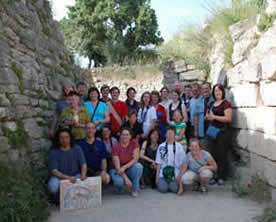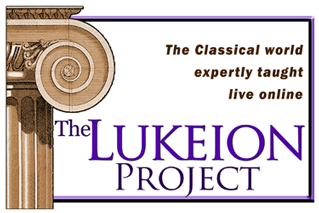Frequently Asked Questions
About The Lukeion Project
 The Lukeion Project Founders Regan and Amy Barr launched The Lukeion Project in 2005. As veteran archaeologists, experts in ancient languages and history, and home educators of three, the Barrs provide a unique educational approach that fosters excellence, enthusiasm and college preparedness. Our teaching staff has expanded to include Dr. Sue Fisher who shares similar expertise.
The Lukeion Project Founders Regan and Amy Barr launched The Lukeion Project in 2005. As veteran archaeologists, experts in ancient languages and history, and home educators of three, the Barrs provide a unique educational approach that fosters excellence, enthusiasm and college preparedness. Our teaching staff has expanded to include Dr. Sue Fisher who shares similar expertise.
- Click here to read about our live online technology and classroom experience.
What is The Lukeion Project & who teaches all the courses?
- Click here for a history of The Lukeion Project and instructor credentials.
Not all online classes are the same
Today it seems like there are a great many 'online' classes available on nearly every subject but beware! 'Online course' can refer to anything from a freeform, unstructured email coorespondence class; to a series of online self-tutorials to a Skype session. You will find that our online method is unparalleled.
When comparing our courses to others, consider The Lukeion Project difference. All of our courses include:
- Live instruction (not a chat room nor a recording though those are available on request)
- Organized, well-paced, action-packed one hour sessions help challenge and keep students on track
- Challenging semester courses graded by instructors
- Beautifully illustrated with extensive proprietary collection of images from throughout the Classical world (not a 'talking head' video of the instructor).
- Instructors maintain full control of each session for the optimal learning environment.
- Classes are well annotated (a great way to develop note taking skills and a real boost for the visual learner)
- Courses are packed with extra learning tools: practice games, links, primary sources, helpful handouts, and much more.
All operating systems work in our online classroom. Windows, Mac, Linux--we are cross-platform (alas, currently WebEx does not support the use of VoiP with tablets). Your computer will install a little bit of software when you first join our classes. Allow an extra five minutes prior to the start of the first session you attend to allow your computer to load the essential software.
Some public computers (at libraries or public schools, for example) will not allow you to install this software without special permission. Speak to your local technical personnel to allow you to install this software snippet on a public computer.
Though our online classroom is equipped for two-way voice (VoIP) and video, we find that there are too many distractions if we turn on all the bells and whistles. Students only need to have computer speakers or a headset to hear the instructor's voice for most classes unless otherwise noted. Students will communicate during class using through chat that may be visible to other students at the instructor's discussion.
Accreditation at the high school level is different than accreditation at the college level. There is no approved list of accrediting institutions at the secondary level for non-public schools. "If your child completes a high school-level text by a reputable publisher in an academic course (math, science, English, foreign language, or history), consider the material covered to be one credit. A one credit course typically requires one school year to complete (HSLDA)."
The term 'accredited' at the high school level indicates an affiliation between a private institution and an accrediting post secondary institution. Such an affiliation comes at a cost and would make our courses significantly more expensive.
If you are interested in taking our courses but are completing a program offered by a public or private institution, we will be happy to speak the principal or registrar of that institution. The credentials of all our instructors have been by accepted by a wide variety of both public and private institutions "for credit." Please check with your institution. We are happy to work with them to help you take our courses.
We know that individuals are driven by interest sometimes ahead of skill. That is why our workshops are excellent for just about everyone ages 10 through adult. Quizzes are optional and in-class review polls are just plain fun (our own children fight over who gets to take them). We have had gifted children as young as second grade attend our workshops with a parent, as well as retirement age 'arm chair archaeologists'--and everyone in between.
We ask that our semester-long classes be attended by those functioning at the high school level (not necessarily high school age). There are challenging classes which require a weekly and even daily work commitment. We welcome gifted and profoundly gifted students. We are happy to discuss good placement for your gifted learner at any age.
If you want your younger student to hear the material but not participate in the class through tests and papers, please consider the option of auditing the course (this is only an option if the class is not full and is not recommended for language courses).
It’s true that the truths (facts) of history are not changing, BUT no one has all the facts, so our understanding of history is progressing daily as we learn more. Every day archaeologists, historians, and philologists (linguists) are making discoveries that can fundamentally change our understanding of the ancient world. Any tutorial or book is likely to be out-of-date as soon as it goes to press.
For example, the Bible tells us that King David captured Jerusalem, made it his capital, and built his palace there, no monumental architecture from the period of his reign had been found. This led some researchers to question the importance of David as a historical figure, and of Jerusalem as an influential city. However, in 2005, archaeologists working in the area unearthed the monumental architecture we’d known was there all along. One of our former professors co-authored the article on this magnificent find in Biblical Archaeology Review.
Another example is a discovery published in March of 2006 fundamentally changed our view of the Jewish Revolt which resulted in the destruction of the Temple by the Roman general Titus and his army. Traditional textbooks will say that pressure had been building, but that the revolt was spontaneous in nature. When underground tunnels filled with supplies were discovered in Galilee, it became clear that the Revolt was not spontaneous. People had been carefully and systematically preparing for this revolt for some time.
History can either be exciting and thought-provoking, or it can be dull and lifeless. Our high school experience with ancient history definitely fell into the latter category, and it was’t until years later we discovered what we’d been missing. Our classes are highly visual, filled with the little-known facts and stories that make it exciting to us, and interdisciplinary. While you can study “history” separately from the arts, literature, and archaeology of the selected period, we don’t recommend it. That’s the fastest way to kill your child’s interest in history.
Many states now 'require' a world history credit. It makes good sense to complete what is needed on a high school transcript, but to stop at these bare bones minimum of a single 'world history' course will rob your student of an understanding of Western Civilization, literature, culture, politics, law...the list goes on. It is impossible to be adequately prepared for the future unless you are adequately versed in the past.
If you would understand anything, observe its beginning and its development~Aristotle
Latin and ancient Greek are challenging languages for a number of reasons. Unlike modern spoken languages, these ancient languages must be read and understood at a fast pace. Students will be expected to master around 20 new vocabulary words as well as new verb/noun or pronoun forms each week. They must practice syntax and grammar by translating as much as possible and submit homework on schedule. Expect a weekly quiz for both languages.
To succeed at these courses, a student must have a mature work ethic, a comfortable familiarity with English grammar, and a willingness to ask for help from the instructor if the grammar becomes confusing.
Readiness for the accelerated high school level pace of Lukeion Latin and Lukeion Greek should be carefully evaluated based on these skills. Some students perform beautifully at age 12 while others are still not ready for this type of challenge until they are much older (age 14 or 15). Conversely, due to the 'ageless' nature of an online classroom, we are happy to accept non traditional students: young gifted students and adults are always welcome.
Having a previous background in Latin and Greek is not necessary. A comfortable understanding of English grammar is highly recommended. An excellent way to prepare for either language is a program in sentence diagramming.
If you would like to make a donation toward providing scholarships for missionary families, retired individuals on a fixed income, home educated children of widows, families that have suffered a recent hardship (tragedy, house fire, etc.) you may donate any amount and, if you wish, specify those for whom you would like to provide support. Similarly, you can purchase gift certificates.
If you don't find the answer to your question here, feel free to contact us (click the purple link): inf...@lukeion.org. We will try to be quick with an answer.


